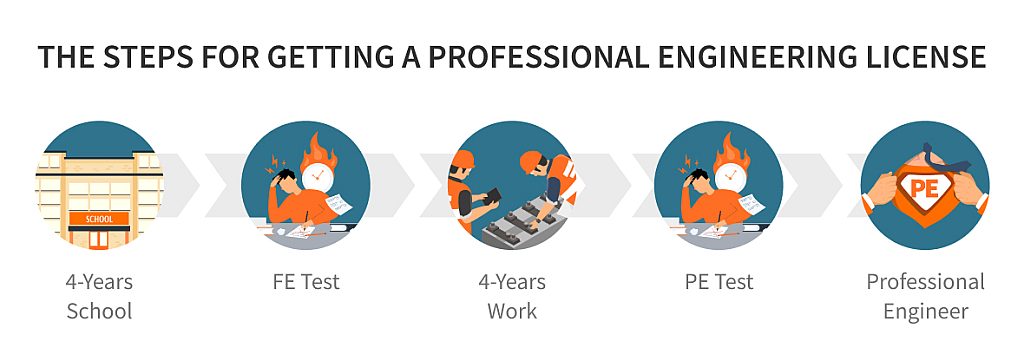Students of engineering have many reasons for studying their chosen field: career prospects, curiosity, accomplishment, or benefit to society. You probably have your reasons too, which may be predictable or unusual, depending on your outlook.
One of the top 10 reasons that always surfaces in surveys of both engineering students and practitioners is prestige. Engineering as a profession is seen as valued by and important to society.
When you’re about to graduate from a formal engineering school, or if you’re simply looking for ways to add value to your chosen career, the subject of a professional engineering (PE) license often comes up, including whether or not this credential is worth the effort.
What does Professional Engineer Mean?
A professional engineering license means that a person has met the criteria and has been licensed by an individual state board to practice engineering in that state. It is an affirmation by a third party that you have the minimum skills and experience necessary to work in a profession that may have an impact on the safety of the general public.
It does not warrant that you will be good at it, promise that you’ll land a better job, or guarantee a ticket to the corner office. It simply verifies that you’ve done what is required to get the license.
According to our friends at OnlineComponents.com, who has an informative article on this topic: "A Professional Engineering License - Should you get one?" There are several good reasons to get your license. These include:
- Some states require it in order to be called an engineer.
- It may lead to enhanced opportunities and earnings throughout a career.
- It offers a certain amount of prestige and respect from your peers.
- Many states require it in order to teach engineering.
- Only a licensed PE can prepare, sign, and submit engineering documents to a public authority.
How do I Obtain a PE License?

If you are enrolled in an academic engineering program, your school will likely inform you of the procedure prior to your graduation. Here are the necessary steps:
- Earn a 4-year degree in engineering from an accredited program.
- Pass the Fundamentals of Engineering (FE) exam.
- Accumulate 4 years of qualified work experience that has been supervised by a licensed PE.
- Pass the Principles and Practice of Engineering (PE) exam.
You should also acquaint yourself with the PE standards for your own state, as each state sets its own policies. The National Society of Professional Engineers (NSPE) provides additional information on its website at NSPE.org.
Is a PE License Necessary to Work as an Engineer?
In a word, no. While it may be an important credential to earn, it is usually not required for engineering employment, especially in a market where engineering skills are in demand. Like advanced accreditation in the fields of law, accounting, and medicine, however, it may certainly be a professional asset that can add significant value to your resume.










